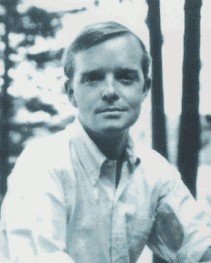How Much Of This Is True, Man?
 I haven't yet seen the film 'Capote', but I intend to do so at the earliest opportunity.
I first read 'In Cold Blood' when I was a schoolboy, just shortly after it was published. I remember being pulled right into it by the very first sentence,
"The village of Holcomb stands on the high wheat plains of Western Kansas, a lonesome area that other Kansans call 'out there'".
For a bloodthirsty adolescent, it helped that the story was a true one, based on the brutal murder of an entire Kansas family by a couple of travelling psychos in 1959.
At that age, I was entirely untroubled by any moral or ethical debate about the propriety of effectively creating a thriller from real life slaughter. It mattered nothing to me that Truman Capote had interviewed the killers before their judicial executions, and had apparently empathised with them in a way which many found distasteful.
All I knew was that it was an exciting story told by a master teller.
Truman Capote was one of the more notorious writers of the 20th century. He was an overt homosexual in a time when gay men rarely came out of the closet and he was a very witty man. As a result of public feuds with such figures as Jackie Onassis, Norman Mailer and Gore Vidal, he kept himself constantly in the public eye, and he was much in demand as a dinner guest on the beautiful people circuit in New York and elsewhere. His ambition was to write what he called an "epic nonfiction novel." The novel that came as a result of that desire occurred after he and childhood friend Harper Lee (writer of To Kill a Mockingbird) investigated the 1959 murders of a wealthy Kansas ranch family of four. Though initially the pair viewed the project as a simple "whodunit," the far-reaching results of their research had an enormous impact on Capote's life. He put five years of intense research into the book, and in the process developed an intense and complex relationship with the two murderers, Richard Eugene Hickock and Perry Smith. In particular, Smith became a source of fascination to the author, though he is certainly a most disturbing character.
The book was published in 1966. Truman said of it, "Every word is true" (man). Whether it's all true or not, it is still, 40 years later, a book capable of making you feel very uneasy for a whole host of reasons.
Read the book before you see the film, otherwise I suspect that the story of Truman Capote's life, of which the book was the centre, will not make much sense.
I haven't yet seen the film 'Capote', but I intend to do so at the earliest opportunity.
I first read 'In Cold Blood' when I was a schoolboy, just shortly after it was published. I remember being pulled right into it by the very first sentence,
"The village of Holcomb stands on the high wheat plains of Western Kansas, a lonesome area that other Kansans call 'out there'".
For a bloodthirsty adolescent, it helped that the story was a true one, based on the brutal murder of an entire Kansas family by a couple of travelling psychos in 1959.
At that age, I was entirely untroubled by any moral or ethical debate about the propriety of effectively creating a thriller from real life slaughter. It mattered nothing to me that Truman Capote had interviewed the killers before their judicial executions, and had apparently empathised with them in a way which many found distasteful.
All I knew was that it was an exciting story told by a master teller.
Truman Capote was one of the more notorious writers of the 20th century. He was an overt homosexual in a time when gay men rarely came out of the closet and he was a very witty man. As a result of public feuds with such figures as Jackie Onassis, Norman Mailer and Gore Vidal, he kept himself constantly in the public eye, and he was much in demand as a dinner guest on the beautiful people circuit in New York and elsewhere. His ambition was to write what he called an "epic nonfiction novel." The novel that came as a result of that desire occurred after he and childhood friend Harper Lee (writer of To Kill a Mockingbird) investigated the 1959 murders of a wealthy Kansas ranch family of four. Though initially the pair viewed the project as a simple "whodunit," the far-reaching results of their research had an enormous impact on Capote's life. He put five years of intense research into the book, and in the process developed an intense and complex relationship with the two murderers, Richard Eugene Hickock and Perry Smith. In particular, Smith became a source of fascination to the author, though he is certainly a most disturbing character.
The book was published in 1966. Truman said of it, "Every word is true" (man). Whether it's all true or not, it is still, 40 years later, a book capable of making you feel very uneasy for a whole host of reasons.
Read the book before you see the film, otherwise I suspect that the story of Truman Capote's life, of which the book was the centre, will not make much sense.


1 Comments:
Ah, yes, "On The Road" - the beatnik's travel handbook.
Coming soon to a blog near you (but probably not until they've fixed my arteries) a complete review of all the leading beat books - 'On the Road', Woody Guthrie's 'Bound For Glory', Ginsberg's 'Howl', 'Really the Blues' by Mezz Mezzrow, Dylan's 'Chronicles', and many others too numerous to mention here.
Meantime, makwuzere could feel free to contribute a review or two himself
Post a Comment
<< Home